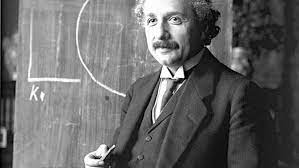“Albert Einstein’s 1939 Letter on Atomic Bombs Fetches ₹32.7 Crore at Auction”
A copy of Albert Einstein’s pivotal 1939 letter, which played a crucial role in initiating the development of the atomic bomb, has been sold for a staggering $3.9 million (approximately ₹32.7 crore) at a Christie’s auction. The letter, addressed to then-U.S. President Franklin D. Roosevelt, was sold from the private collection of late Microsoft co-founder Paul Allen.


A copy of Albert Einstein’s pivotal 1939 letter, which played a crucial role in initiating the development of the atomic bomb, has been sold for a staggering $3.9 million (approximately ₹32.7 crore) at a Christie’s auction. The letter, addressed to then-U.S. President Franklin D. Roosevelt, was sold from the private collection of late Microsoft co-founder Paul Allen.
The letter, penned by Einstein and signed by him, warned Roosevelt of the potential for nuclear weapons and urged the U.S. to begin its own research into nuclear fission. This correspondence was instrumental in catalyzing the U.S. government’s efforts in nuclear research, ultimately leading to the Manhattan Project and the development of the first atomic bombs during World War II.
A Historic Warning
Einstein’s letter, written in the summer of 1939, outlined the potential of uranium as a powerful new source of energy that could be harnessed to create extremely powerful bombs. This communication was driven by Einstein’s concern that Germany might be developing nuclear weapons under Adolf Hitler’s regime. The urgency and scientific foresight in the letter were critical in persuading the U.S. to accelerate its nuclear research.
Peter Klarnet, Christie’s senior specialist for Americana, books, and manuscripts, called the letter “one of the most influential letters in history.” The sale of this letter underscores its profound impact on shaping the course of history, marking the beginning of the nuclear arms race and altering global military strategies during and after World War II.
From Private Hands to Auction
The sold copy was the only one in private hands, having been part of Paul Allen’s collection. It was purchased in 2002 for $2.1 million and previously belonged to publisher Malcolm Forbes, who acquired it from physicist Leo Szilard’s estate. Szilard, a key collaborator with Einstein, had a significant role in the letter’s creation and dissemination.
Einstein’s Regret
Despite his crucial role in advancing nuclear science, Einstein later expressed deep regret over his involvement in the nuclear arms race. He referred to his participation in the development of nuclear weapons as his “one great mistake.” After the bombings of Hiroshima and Nagasaki in 1945, Einstein reportedly lamented the profound humanitarian impact of these weapons, reflecting on the immense destruction they caused.
Sources By Agencies







